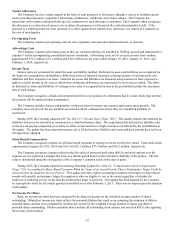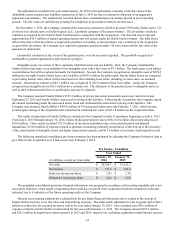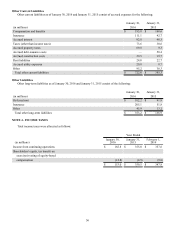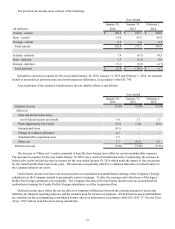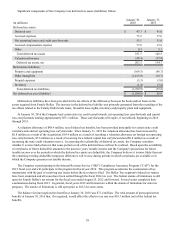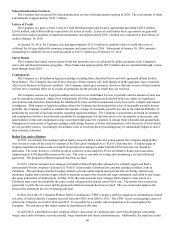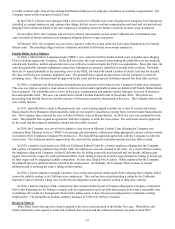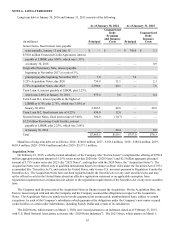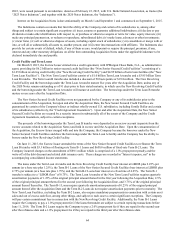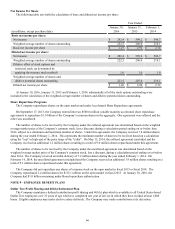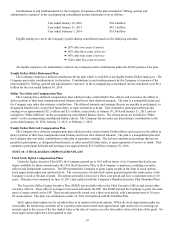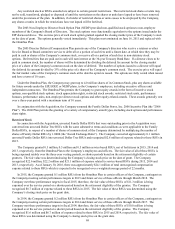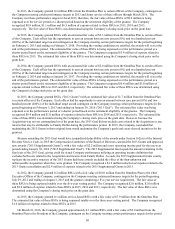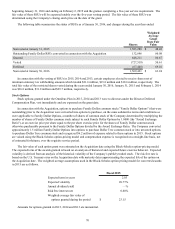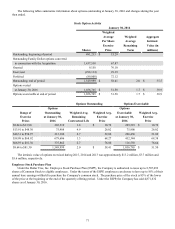Dollar Tree 2015 Annual Report Download - page 77
Download and view the complete annual report
Please find page 77 of the 2015 Dollar Tree annual report below. You can navigate through the pages in the report by either clicking on the pages listed below, or by using the keyword search tool below to find specific information within the annual report.
61
to certify a nation-wide class of non-exempt distribution employees for improper calculation of overtime compensation. The
Company removed this lawsuit to Federal Court.
In April 2015, a former store manager filed a class action in California state court alleging store managers were improperly
classified as exempt employees and, among other things, did not receive overtime compensation and meal and rest periods and
alleging PAGA claims on behalf of all store employees, including claims for failure to provide accurate wage statements.
In November 2015, the Company was served in a PAGA representative action under California law in California state
court on behalf of former assistant store managers alleging defective wage statements.
In February 2016, the Company was served in a putative collective action under the Fair Labor Standards Act in Florida
federal court. The pleadings allege overtime violations on behalf of all hourly non-exempt employees.
Family Dollar Active Matters
In 2008, a Multi-District Litigation forum ("MDL") was created in North Carolina federal court to handle cases alleging
FLSA violations against the Company. In the first two cases, the court entered orders finding the plaintiffs were not similarly
situated and, therefore, neither nationwide notice nor collective treatment under the FLSA was appropriate. Since that time, the
court has granted 60 summary judgments ruling Store Managers are properly classified as exempt from overtime. Presently,
there are 10 named plaintiffs in the remaining cases in the MDL, for which the North Carolina Federal Court has not decided
the class certification or summary judgment issue. The plaintiffs have signed an agreement with the Company to settle all
remaining cases. The settlement must be approved by the court and the proposed settlement amount has been fully accrued.
In 2008, a complaint was filed alleging discriminatory pay practices with respect to the Company's female store managers.
This case was pled as a putative class action or collective action under applicable statutes on behalf of all Family Dollar female
store managers. The plaintiffs seek recovery of back pay, compensatory and punitive money damages, recovery of attorneys'
fees and equitable relief. The case was transferred to North Carolina Federal Court in November 2008. The parties are
proceeding with limited discovery and the outcome of this matter cannot be determined at this time. The Company believes the
case is fully insured.
In 2013, plaintiffs filed a claim in Massachusetts state court seeking unpaid overtime for a class of current and former
Massachusetts Store Managers whom plaintiffs claim are not properly classified as exempt from overtime under Massachusetts
law. The Company then removed the case to Federal District court in Massachusetts. In 2014, the case was remanded to state
court. The plaintiffs have signed an agreement with the Company to settle the class action. The settlement must be approved
by the court and the proposed settlement amount has been fully accrued.
In 2014, the Company was served with a putative class action in Missouri Federal Court alleging the Company sent
customers Short Message Service ("SMS") text message advertisements, without providing appropriate express written consent
in violation of the Telephone Consumer Protection Act. The plaintiff has signed an agreement with the Company to settle the
class action. The settlement must be approved by the court and the proposed settlement amount has been fully accrued.
In 2014, a putative class action was filed in a California Federal Court by a former employee alleging that the Company
had a policy of requiring employee bag checks while the employees were not clocked in for work. As a result of those actions,
the employee alleges the Company violated California law by failing to provide meal periods and rest breaks, failing to pay
regular and overtime wages for work performed off the clock, failing to provide accurate wage statements, failing to timely pay
all final wages and by engaging in unfair competition. He has also alleged PAGA claims. While employed by the Company,
the plaintiff agreed to arbitrate matters related to his employment. Accordingly, the Company filed a motion to compel
arbitration and is awaiting the court’s ruling on that motion.
In 2014, a former employee brought a putative class action and asserted claims under PAGA alleging the Company failed
to provide suitable seating to its California store employees. The case has been stayed pending a ruling by the California
Supreme Court on whether a drug store retailer has an obligation to provide suitable seating to drug store cashiers.
In 2014, a former employee filed a nationwide class action in federal court in Virginia alleging the Company violated the
Fair Credit Reporting Act by failing to comply with its requirements to give an individual proper notice and a reasonable time
to challenge the results of a background check before taking action to deny the person employment (or terminate existing
employment). The plaintiffs are seeking statutory damages of $100 to $1,000 per violation.
Resolved Matters
Winn-Dixie Stores has agreed to drop its appeal of the lower court decision in the Dollar Tree case. Winn-Dixie and
Family Dollar have also agreed to settle and terminate their lawsuit and the settlement amount was paid in fiscal 2015.



